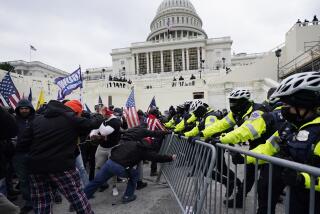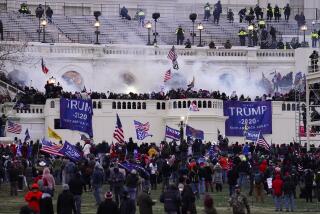Court Rejects Tougher Proof of Drug Conspiracy : Judiciary: Prosecutors only have to show narcotic bosses had agreement to foster illegality. Justices say evidence of overt action in the plot is not required.
- Share via
WASHINGTON — Drug kingpins can be convicted of conspiring to sell drugs even if they did nothing specific to further the conspiracy, the Supreme Court ruled Tuesday.
So long as prosecutors can show that several drug defendants had “an agreement (among themselves) to commit an unlawful act,” they can be convicted of violating the federal drug conspiracy act, the justices said in a unanimous opinion.
The ruling overturns a decision of the U.S. 9th Circuit Court of Appeals in California, which, standing alone, had insisted that prosecutors prove a defendant had committed an “overt act” to further the drug conspiracy.
Congress did not include this requirement in the Anti-Drug Abuse Act of 1988, Justice Department lawyers noted, and the high court wasted no time in reversing the appeals court’s ruling.
Tuesday’s ruling, the first of the new term, is consistent with the court’s tendency to support the government’s war on drugs.
Conspiracies almost by their nature are hard to define. In some statutes, Congress has said that persons violate the conspiracy act only if they undertake “an act to effect” the conspiracy.
But as part of the war on drugs in the 1980s, Congress defined the violations broadly and the high court regularly has upheld those broad statutes.
The 1988 law says that “any person who attempts or conspires to commit any offense,” such as selling drugs, is guilty of violating the anti-drug law just as though he had sold drugs directly. For prosecutors, this conspiracy provision is especially useful for convicting the leaders of a drug ring who may not be involved in day-to-day drug running.
Federal prosecutors in Anchorage charged Resat Shabani in 1990 with conspiring with his woman friend and several others to ship cocaine from California to Alaska, where it was sold. FBI investigators infiltrated the ring and purchased drugs from the woman. She testified for the prosecution.
Based on this evidence, Shabani was convicted by a jury and sentenced to 13 years in prison.
But last year, a three-judge panel of the 9th Circuit Court threw out his conviction on the grounds that prosecutors had not proved that Shabani performed an “overt act” to further the conspiracy.
Speaking for the court in the case (Shabani vs. United States, 93-981), Justice Sandra Day O’Connor said that Congress did not include this requirement in the law “and we have not inferred such a requirement.” Thus, “the government need not prove the commission of any overt acts in furtherance of the conspiracy,” she said.
Meanwhile, the court heard arguments Tuesday on whether the airlines may unilaterally change the terms of their frequent flier programs.
Lawyers representing the 4 million frequent fliers on American Airlines filed suit in Chicago contesting proposed changes in the program and the Illinois Supreme Court cleared the case for a trial on the theory that the changes may violate a contract under state law.
But lawyers for the airlines are asking the justices to throw out the lawsuit on grounds that the federal law deregulating the nation’s airlines preempts interference by state courts. A ruling in the case (American Airlines vs. Wolens, 93-1286) is likely in a few months.
More to Read
Sign up for Essential California
The most important California stories and recommendations in your inbox every morning.
You may occasionally receive promotional content from the Los Angeles Times.














